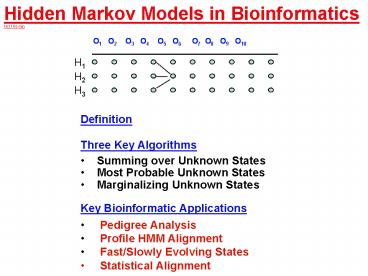Hidden Markov Models in Bioinformatics 14'11 60 min - PowerPoint PPT Presentation
1 / 17
Title:
Hidden Markov Models in Bioinformatics 14'11 60 min
Description:
... distribution of Ok only depends on the value of Hi and is called the emit function ... All variables has a finite set of substitution rules. ... – PowerPoint PPT presentation
Number of Views:41
Avg rating:3.0/5.0
Title: Hidden Markov Models in Bioinformatics 14'11 60 min
1
Hidden Markov Models in Bioinformatics 14.11 60
min
- Definition
- Three Key Algorithms
- Summing over Unknown States
- Most Probable Unknown States
- Marginalizing Unknown States
- Key Bioinformatic Applications
- Pedigree Analysis
- Profile HMM Alignment
- Fast/Slowly Evolving States
- Statistical Alignment
2
Hidden Markov Models
- The marginal distribution of the His are
described by a Homogenous Markov Chain - pi,j P(Hki,Hk1j)
- Let pi PH1i) - often pi is the equilibrium
distribution of the Markov Chain.
- Conditional on Hk (all k), the Ok are
independent.
3
What is the probability of the data?
4
What is the most probable hidden configuration?
Again recursions can be found
5
(No Transcript)
6
Baum-Welch, Parameter Estimation or Training
Objective Evaluate Transition and Emission
Probabilities
- Set pij and e( ) arbirarily to non-zero values
- Use forward-backward to re-evaluate pij and e( )
- Do this until no significant increase in
probability of data
To avoid zero probabilities, add pseudo-counts.
Other numerical optimization algorithms can be
applied.
7
Fast/Slowly Evolving States Felsenstein
Churchill, 1996
- pr - equilibrium distribution of hidden states
(rates) at first position - pi,j - transition probabilities between hidden
states - L(j,r) - likelihood for jth column given rate r.
- L(j,r) - likelihood for first j columns given
jth column has rate r.
8
Recombination HMMs
9
Statistical Alignment Steel and Hein,2001
Holmes and Bruno,2001
Emit functions e() p(N1)f(N1,N2) e(-)
p(N1), e(-) p(N2) p(N1) - equilibrium prob. of
N f(N1,N2) - prob. that N1 evolves into N2
10
Probability of Data given a pedigree.
11
Further Examples
Isochore Churchill,1989,92
Lp(C)Lp(G)0.1, Lp(A)Lp(T)0.4,
Lr(C)Lr(G)0.4, Lr(A)Lr(T)0.1
Likelihood Recursions
Likelihood Initialisations
Simple Eukaryotic
Gene Finding Burge and Karlin, 1996
Simple Prokaryotic
12
Further Examples
Secondary Structure Elements Goldman, 1996
HMM for SSEs
Adding Evolution
SSE Prediction
Profile HMM Alignment Krogh et al.,1994
13
Summary
- Definition
- Three Key Algorithms
- Summing over Unknown States
- Most Probable Unknown States
- Marginalizing Unknown States
- Key Bioinformatic Applications
- Pedigree Analysis
- Isochores in Genomes (CG-rich regions)
- Profile HMM Alignment
- Fast/Slowly Evolving States
- Secondary Structure Elements in Proteins
- Gene Finding
- Statistical Alignment
14
Grammars Finite Set of Rules for Generating
Strings
15
Simple String Generators Terminals (capital)
--- Non-Terminals (small) i. Start with S
S --gt aT bS T
--gt aS bT ? One sentence odd of as S-gt
aT -gt aaS gt aabS -gt aabaT -gt aaba ii. ?S--gt
aSa bSb aa bb One sentence (even length
palindromes) S--gt aSa --gt abSba --gt abaaba
16
Stochastic Grammars
The grammars above classify all string as
belonging to the language or not.
All variables has a finite set of substitution
rules. Assigning probabilities to the use of
each rule will assign probabilities to the
strings in the language.
If there is a 1-1 derivation (creation) of a
string, the probability of a string can be
obtained as the product probability of the
applied rules.
i. Start with S. S --gt (0.3)aT (0.7)bS
T --gt (0.2)aS (0.4)bT (0.2)?
0.2
0.7
0.3
0.3
S -gt aT -gt aaS gt aabS -gt aabaT -gt aaba
0.2
ii. ?S--gt (0.3)aSa (0.5)bSb (0.1)aa (0.1)bb
0.1
0.3
0.5
S -gt aSa -gt abSba -gt abaaba
17
Recommended Literature
Vineet Bafna and Daniel H. Huson (2000) The
Conserved Exon Method for Gene Finding ISMB 2000
pp. 3-12 S.Batzoglou et al.(2000) Human and
Mouse Gene Structure Comparative Analysis and
Application to Exon Prediction. Genome Research.
10.950-58. Blayo, Rouze Sagot (2002) Orphan
Gene Finding - An exon assembly approach
J.Comp.Biol. Delcher, AL et al.(1998) Alignment
of Whole Genomes Nuc.Ac.Res. 27.11.2369-76. Grave
ly, BR (2001) Alternative Splicing increasing
diversity in the proteomic world. TIGS
17.2.100- Guigo, R.et al.(2000) An Assesment of
Gene Prediction Accuracy in Large DNA Sequences.
Genome Research 10.1631-42 Kan, Z. Et al. (2001)
Gene Structure Prediction and Alternative
Splicing Using Genomically Aligned ESTs Genome
Research 11.889-900. Ian Korf et al.(2001)
Integrating genomic homology into gene structure
prediction. Bioinformatics vol17.Suppl.1 pages
140-148 Tejs Scharling (2001) Gene-identification
using sequence comparison. Aarhus University JS
Pedersen (2001) Progress Report Comparative Gene
Finding. Aarhus University Reese,MG et
al.(2000) Genome Annotation Assessment in
Drosophila melanogaster Genome Research
10.483-501. Stein,L.(2001) Genome Annotation
From Sequence to Biology. Nature Reviews Genetics
2.493-































